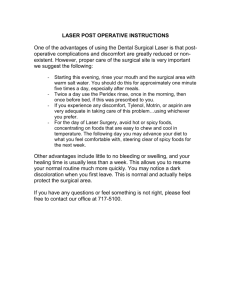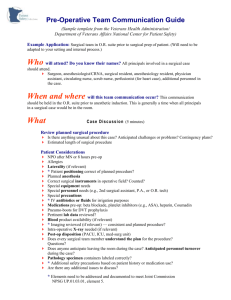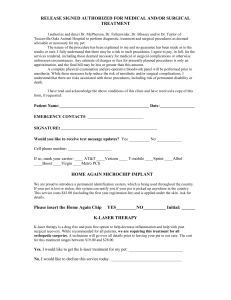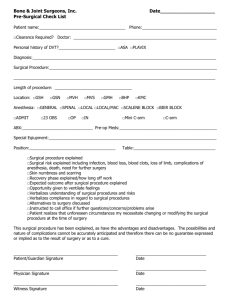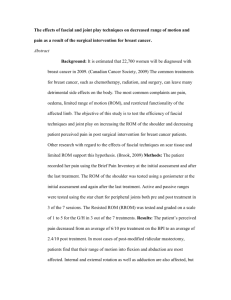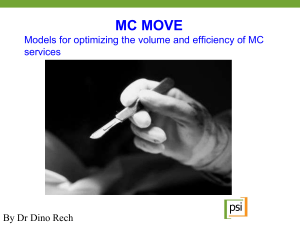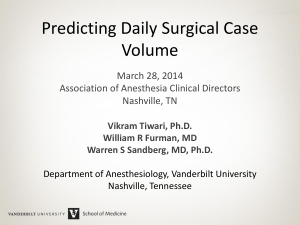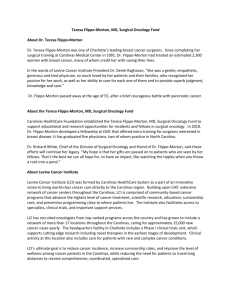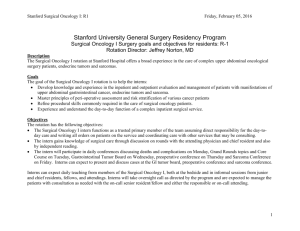PGY 5 Surgical Oncology Kaiser
advertisement
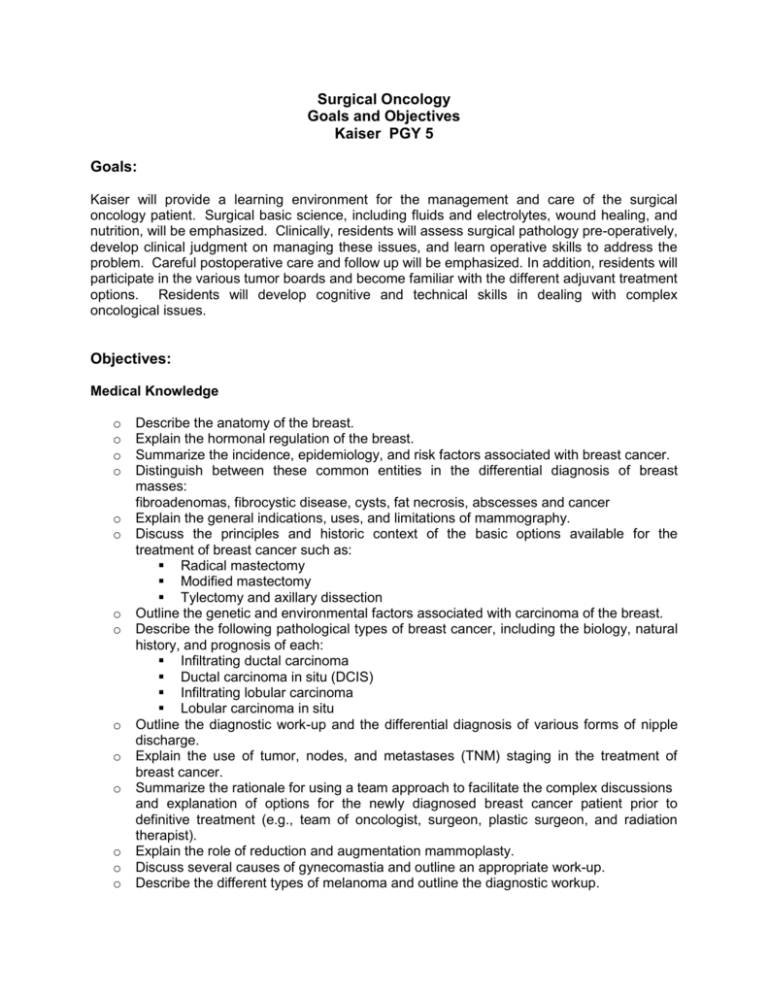
Surgical Oncology Goals and Objectives Kaiser PGY 5 Goals: Kaiser will provide a learning environment for the management and care of the surgical oncology patient. Surgical basic science, including fluids and electrolytes, wound healing, and nutrition, will be emphasized. Clinically, residents will assess surgical pathology pre-operatively, develop clinical judgment on managing these issues, and learn operative skills to address the problem. Careful postoperative care and follow up will be emphasized. In addition, residents will participate in the various tumor boards and become familiar with the different adjuvant treatment options. Residents will develop cognitive and technical skills in dealing with complex oncological issues. Objectives: Medical Knowledge o o o o o o o o o o o o o o Describe the anatomy of the breast. Explain the hormonal regulation of the breast. Summarize the incidence, epidemiology, and risk factors associated with breast cancer. Distinguish between these common entities in the differential diagnosis of breast masses: fibroadenomas, fibrocystic disease, cysts, fat necrosis, abscesses and cancer Explain the general indications, uses, and limitations of mammography. Discuss the principles and historic context of the basic options available for the treatment of breast cancer such as: Radical mastectomy Modified mastectomy Tylectomy and axillary dissection Outline the genetic and environmental factors associated with carcinoma of the breast. Describe the following pathological types of breast cancer, including the biology, natural history, and prognosis of each: Infiltrating ductal carcinoma Ductal carcinoma in situ (DCIS) Infiltrating lobular carcinoma Lobular carcinoma in situ Outline the diagnostic work-up and the differential diagnosis of various forms of nipple discharge. Explain the use of tumor, nodes, and metastases (TNM) staging in the treatment of breast cancer. Summarize the rationale for using a team approach to facilitate the complex discussions and explanation of options for the newly diagnosed breast cancer patient prior to definitive treatment (e.g., team of oncologist, surgeon, plastic surgeon, and radiation therapist). Explain the role of reduction and augmentation mammoplasty. Discuss several causes of gynecomastia and outline an appropriate work-up. Describe the different types of melanoma and outline the diagnostic workup. o o o o o o o Discuss the role and principles of sentinel lymph node biopsy in melanoma. Discuss the treatment including wide local excision according the depth of invasion of melanoma. Describe the different neoadjuvant therapies available in the treatment of melanoma. Have an understanding of the pathophysiology of sarcoma including subtypes, their natural history, prognosis, and treatment modalities. Describe the diagnostic workup that follows the diagnosis of sarcoma. Describe the diagnostic workup associated with colorectal, esophageal, gastric and pancreatic cancers. Explain the use of tumor, nodes, and metastases (TNM) staging in the treatment of colorectal, esophageal and pancreatic cancer. Patient Care: o o o o o o o o o o o Establish basic proficiency in providing pre-operative and post-operative care (writes appropriate pre-op and post-op orders for floor patients, handles nursing calls appropriately, and manages most routine post-operative care with minimal intervention by supervisor). Take an appropriate history to evaluate patients with surgical oncology issues to include: A complete history of present illness Presence of any co-morbidities A review of social and family history impacting the present problem A complete review of systems Demonstrate an increasing level of skill in the physical examination of the surgical oncology patient. Develop a proficiency in evaluation and interpretation of the different diagnostic modalities including: X-Rays, Ultrasounds, CT scans, contrast studies and MRIs. Discuss treatment options, risks and potential complications of patients with surgical issues. Assist in the performance of surgical procedures. Demonstrate skill in basic surgical techniques, including: Knot tying Exposure and retraction Knowledge of instrumentation Incisions Closure of incisions Handling of graft material including mesh Establishing pneumoperitoneum Handling of laparoscopic instruments Handling of the laparoscopic camera Demonstrate knowledge in steps and conduct during major surgical procedures. Have clear indications and know when it is appropriate to perform a surgical procedure. Have an understanding of when it is not appropriate to operate. Demonstrate knowledge of steps to be taken to have a patient ready for surgery including preop workup and medical clearance. Professionalism: o The Resident should be receptive to feedback on performance, attentive to ethical issues and be involved in end-of-life discussions and decisions. o o o o o o o Understand the importance of honesty in the doctor-patient relationship and other medical interactions. Treat each patient, regardless of social or other circumstances, with the same degree of respect you would afford to your own family members. Complete all assigned patient care tasks for which you are responsible or provide complete sign out to the on-call resident. Maintain a presentable appearance that sets the standard for the hospital this includes but is not limited to adequate hygiene and appropriate dress. Scrubs should be worn only when operating or while on call. Assist with families of critically injured/ill patients and guidance of families towards or through difficult decisions. Demonstrate mentoring and positive role-modeling skills Complete the professional curriculum for the current month Systems-Based Practice: o o o o o o o o Understand, review, and contribute to the refinement of clinical pathways Understand the cost implications of medical decision-making Partner with health care management to facilitate resource efficient utilization of the hospital’s resources. Describe in general terms the benefits of clinical pathway implementation Develop a cost-effective attitude toward patient management. Develop an appreciation for the benefits of a multi-disciplinary approach to management of critically ill surgical patients. Comply with the Health Insurance Portability and Accountability Act of 1996 (HIPAA) regulations regarding patient privacy and confidentiality Complete the systems based practice curriculum for the current month Practice Based Learning & Improvement: o o o o o o o o Demonstrate the ability to: Evaluate published literature in critically acclaimed journals and texts Apply clinical trials data to patient management Participate in academic and clinical discussions Accept responsibility for all dimensions of routine patient management on the wards Apply knowledge of scientific data and best practices to the care of the surgical patient Facilitate learning of medical students and physician assistant students on the team. Use the hospital’s library and databases on on-line resources to obtain up to date information and review recent advances in the care of the surgical patient. Demonstrate a consistent pattern of responsible patient care and application of new knowledge to patient management. Demonstrate a command and facility with on line educational tools. Complete the personal learning project as outlined I the practice based learning and improvement curriculum Interpersonal & Communication Skills: o o o Work as effective team members Cultivate a culture of mutual respect with members of nursing and support staff Develop patterns of frequent and accurate communication with team members and attending staff o o o o o o Gain an appreciation for both verbal and non verbal communication from patients and staff Demonstrate consistent respectful interactions with members of nursing and support staff Demonstrate consistent, accurate and timely communication with members of the surgical team Demonstrate sensitivity and thoughtfulness to patients concerns, and anxieties. The resident will demonstrate the ability to provide and request appropriate consultation from other medical specialists. Complete the interpersonal and communication skills curriculum for the current month Assessments: Patient care and technical skills will be assessed by the attending surgeon in a daily basis. During the formative evaluation at the end of the rotation.
